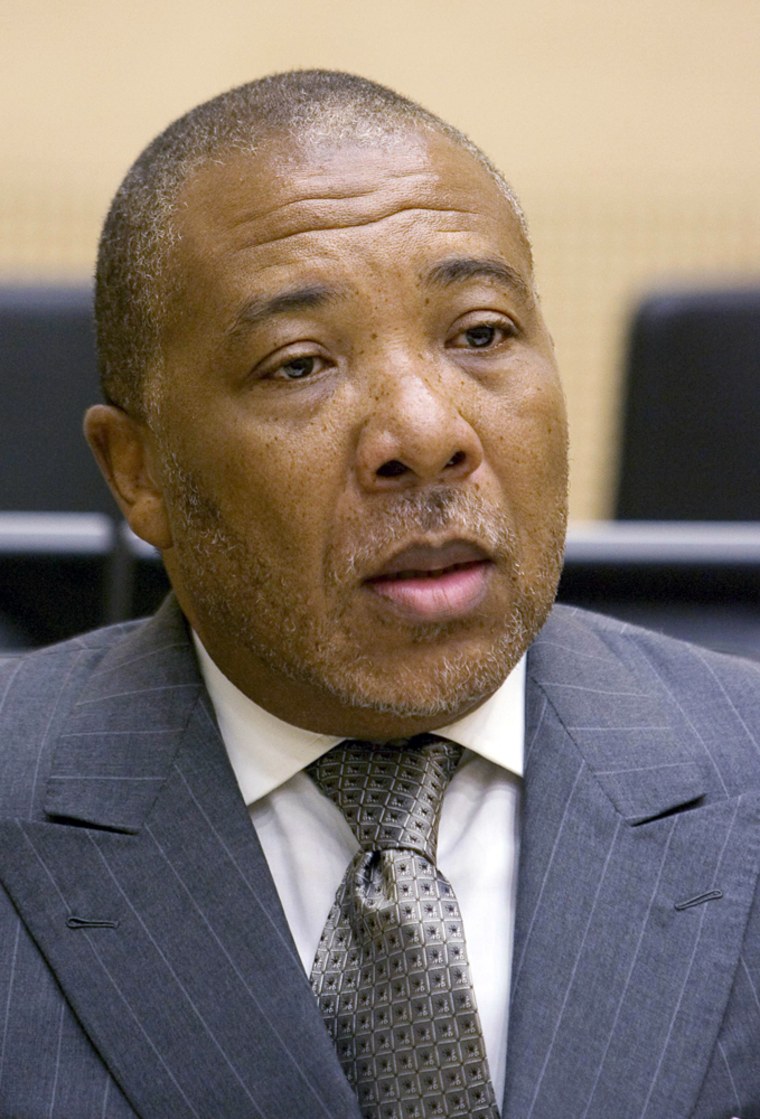Former Liberian President Charles Taylor appeared before a war crimes tribunal in the Netherlands for the first time Friday, with his lawyer complaining about the deposed leader’s limited access to telephones and “Eurocentric” prison food.
Taylor faces 11 charges of war crimes and crimes against humanity for allegedly overseeing the murder, rape and mutilation of thousands of people during neighboring Sierra Leone’s 10-year civil war. The former warlord has pleaded not guilty. He faces life in prison if convicted.
Taylor, wearing a gray pinstripe, double-breasted suit and tie, sat flanked by two U.N. guards in a courtroom of the International Criminal Court that is being rented by the Special Court for Sierra Leone. He did not speak during the 50-minute hearing, which was meant to clear the way for his trial.
Taylor’s attorney, Karim Asad Ahmad Khan, complained about the conditions in the Hague prison and criticized U.N. Secretary-General Kofi Annan for comments he made during a visit earlier this month to the court in Sierra Leone.
Taylor is being detained in a wing of the same maximum security prison in The Hague where former Yugoslav President Slobodan Milosevic died in March while on trial for genocide and war crimes.
Khan said staff shortages at the U.N.-run detention center meant Taylor was locked in his cell for up to 16 hours a day and was unable to make the same number of phone calls he could while being detained in Sierra Leone. He also called the food being served to Taylor “Eurocentric.”
Khan said the detention system in The Hague is “far more draconian ... than operates in Freetown.”
Herman von Hebel, deputy registrar for the Sierra Leone court, described the problems as “startup issues” and said he would visit Taylor next week to ensure they are ironed out.
Lawyer criticizes Kofi Annan
Khan also criticized Annan for referring to war crimes suspects like Taylor as criminals, saying that undermined their right to be presumed innocent.
Khan described Annan’s comment as “not just unseemly; it is repugnant to justice.”
However, presiding judge Richard Lussick assured Khan that judges would ignore Annan’s comments.
“We are totally uninfluenced by what people might say outside the courtroom,” he said.
Prosecutors had hoped to start the trial early next year, but Khan said that was unlikely to be possible.
“For a case of this size and magnitude, particularly given the geographical displacement of this court from Sierra Leone ... I do think that the earliest this trial can properly start is around July of next year,” Khan said.
Prosecutor Brenda Hollis said she may have to call more than 100 witnesses during the case and said some could be asked to testify via video links between the courtroom and Sierra Leone.
However, Khan said he would object to such a move, arguing it would amount to “conducting this trial by remote control” and would deprive him and the judges of the opportunity to watch a witness’ demeanor while testifying.
Taylor was flown to the Netherlands in June amid fears that staging his trial in Sierra Leone could trigger fresh unrest in the war-scarred African nation.
Charges for alleged rebel support
The charges against Taylor stem from his alleged backing of Sierra Leonean rebels, who terrorized victims by chopping off body parts, including lips.
Taylor also launched a Liberian insurgency in 1989 and won elections that handed him the presidency in 1997. Rebels took up arms against him three years later, and he fled to Nigeria in 2003 at the end of Liberia’s 14-year civil war.
In March, he was captured as he attempted to slip out of Nigeria after the country agreed to hand him over to authorities seeking his prosecution.
The Dutch government finally agreed in June to host his trial after British authorities agreed to find a cell for Taylor if he is convicted.
